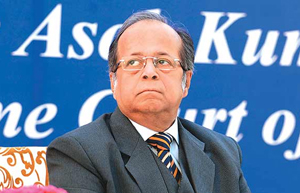 New Delhi, Jan 6: After weeks of holding out, even as the Supreme Court prepares to hear a Public Interest Litigation demanding restraint in any action against Justice A K Ganguly, the retired Supreme Court Judge facing charges of sexual harassment has reportedly decided to resign as the chief of the West Bengal Human Rights Commission.
New Delhi, Jan 6: After weeks of holding out, even as the Supreme Court prepares to hear a Public Interest Litigation demanding restraint in any action against Justice A K Ganguly, the retired Supreme Court Judge facing charges of sexual harassment has reportedly decided to resign as the chief of the West Bengal Human Rights Commission.
"Justice Ganguly has decided to resign and he has told his friends that he is going to quit as the chief of the West Bengal Human Rights Commission," sources told CNN-IBN late Sunday evening.
Last week, the Union Cabinet cleared a move for a Presidential Reference against Ganguly. President Pranab Mukherjee is now expected to refer the complaints against Justice Ganguly to the Chief Justice of India for a SC inquiry. In the eventuality that he indeed resigns, the process of the Presidential Reference and the subsequent inquiry would be rendered futile.
Sources said he would resign once the Presidential Reference is formalised. Ganguly reportedly wrote to former Attorney-General Soli Sorabjee confirming that he is contemplating resigning from the post, as he was being "hounded" to quit the rights body.
Once the Presidential Reference is sent to the apex court, the latter is expected to issue notices to the intern who has made the accusation -- but has not filed an FIR or approached the police for an investigation -- and to Ganguly. A committee may be set up to conduct the inquiry.
While the procedure in a Presidential Reference case may differ from case to case, the SC has previously held that that it may summon witnesses, record their evidence, etc. And, unlike the closed door deliberation of the SC committee, arguments in a Presidential Reference are normally heard in open court.
After an inquiry, the Supreme Court will send a report to the President, based on which a decision will be taken to sacked Justice Ganguly as Chairperson of the WBHRC or otherwise.
Demands for Ganguly's resignation from the WBHRC have been expressed in several quarters after a three-judge Supreme Court panel indicted the judge over allegations of sexual harassment of a female law intern in December, 2012.
The Supreme Court Committee found the allegations levelled against him “prima-facie disclose an act of unwelcome (sexual) behavior.”
Following the report of the SC committee, Justice Ganguly wrote to the Chief Justice of India, protesting the formation of the committee, questioning its legal basis and expressing his belief that the Committee did not follow due process of law. With the Chief Justice later noting that further action was not required on the committee's findings, it was unclear how matters would progress.
Last week, Union Minister for Home Affairs Sushilkumar Shinde confirmed that the Cabinet had approved the move for a Presidential Reference in the case.






Comments
Add new comment